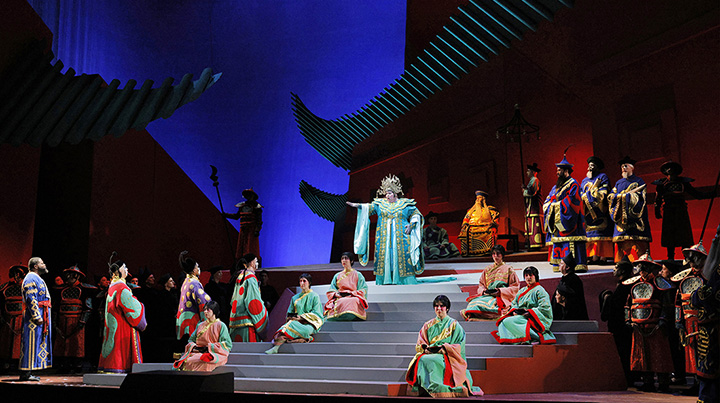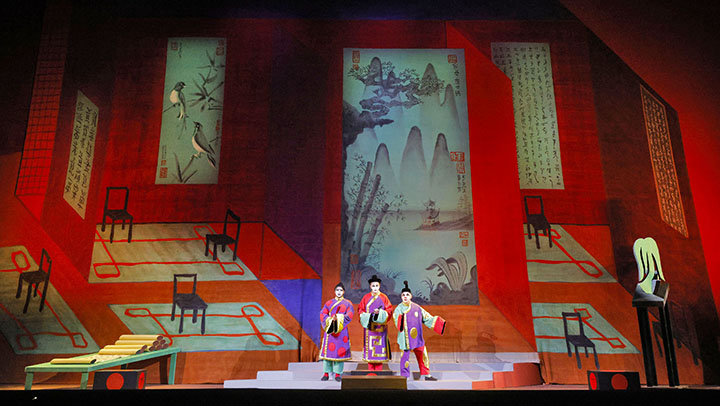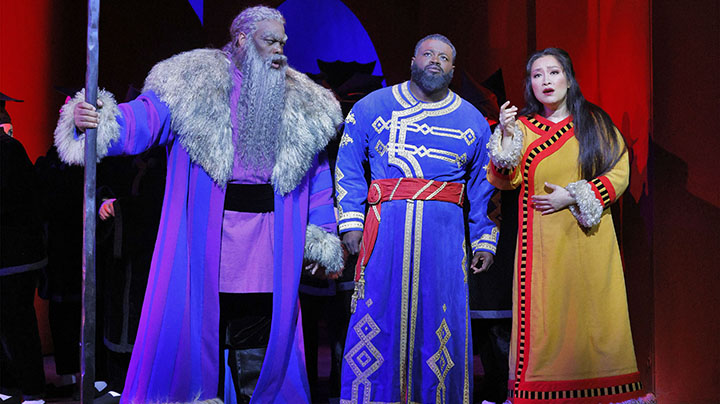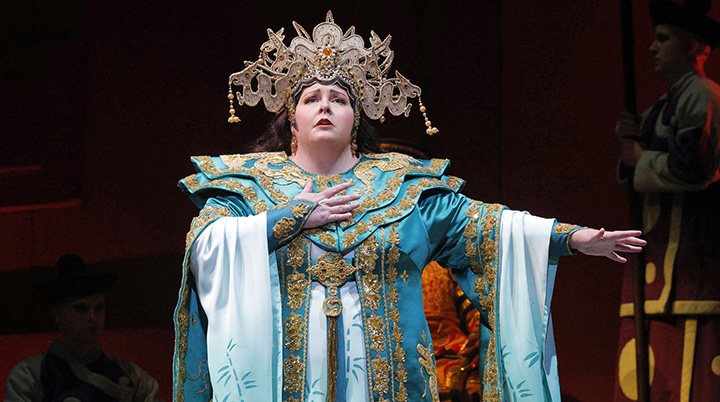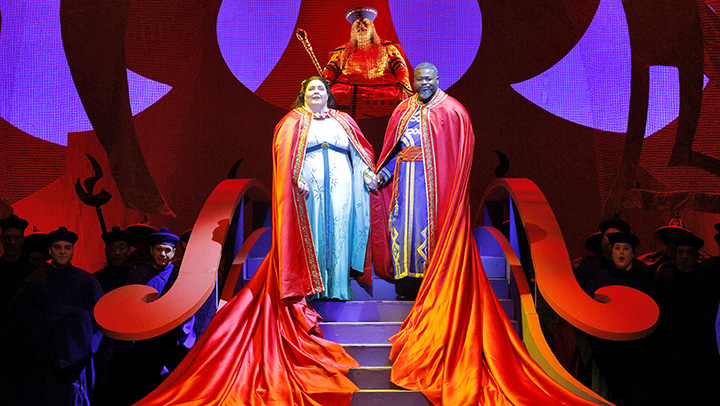How long have I waited since the season announcement last year saying LA Opera was finally (finally, finally) mounting David Hockney’s production of Giacomo Puccini’s Turandot, co-produced by Lyric Opera of Chicago and San Francisco Opera? It debuted way back in 1992 in the Windy City, was then filmed from Baghdad by the Bay in 1993, and I’ve been clutching the DVD (in spite of its middling cast) ever since. Hockney’s stark lines and primary colors magically combine to create a seemingly acid-induced mash-up of Imperial China and Who-ville. Also proving the near perfect antidote to all that Zeffirellian chinoiserie and incense they’re burning over at The Met.
The production history of Turandot at LA Opera is sparse, to put it mildly. One other production in 2002, designed by Michael Scott, featured an Act II set so deep and steeply raked that the soprano singing the title role got spontaneous applause half way through the riddle scene when she finally came into view for the majority of those watching. Her father, the Emperor, was seated so far back and on high that his identity still remains a mystery to many. Giancarlo Del Monaco directed and I heard stories about things being thrown at people in rehearsal (fun). The only one who made it out alive (ironically) and unscathed was the masterful Liu of Hei-Kyung Hong who literally stopped time every time she sang.
The majority of the excitement was generated by the US debut of the new ending to Act III commissioned by the Puccini Foundation and written by Luciano Berio that had been performed in concert in Las Palmas (of all places) but was staged first in Los Angeles, then Amsterdam and finally Salzburg where it was filmed. Yours truly bought tickets in the very front row of the orchestra (I’d have volunteered to turn pages for conductor Kent Nagano if I could have) just to see first-hand what was going on. When the curtain finally came down I will never forget the reaction of the gentleman sitting to my left who turned to his seatmate and said, in a perfectly projected stage whisper, “What the HELL was that?” My sentiments exactly. In spite of Puccini archeologist Riccardo Chailly presenting it at La Scala as recently as 2015, it never stuck. If I had my druthers we’d all be listening to Franco Alfano’s first version of the finale before Maestro Toscanini cut over 100 bars of music from it, but no one consults me on these matters.
The Dorothy Chandler Pavilion in downtown Los Angeles stands at the corners of “1st”, “Hope,”’ and “Grand,” which wholly captured my nervous expectation as I approached for Saturday night’s performance at the Music Center.
My first grand hope was centered on the premiere performance of Angela Meade in the title role. I missed her debut here as Mozart’s Donna Anna in 2012 but she was an impassioned Norma in the Bellini here in 2015. Plus she rode to our rescue in 2020 when the soprano singing Queen Elizabeth in our Roberto Devereux canceled at the very last moment. I’ve naturally followed her career at the Metropolitan Opera closely via the On Demand app since its inception. LA Opera is a great place for an out-of-town tryout since the international press rarely pays any attention to us. The problem with Angela Meade’s career is that she started at the very top, making her professional debut at the Metropolitan Opera as a formidable Elvira in Verdi’s Ernani in 2008, so there’s nowhere to go from there but down. She’s maintained a fairly steady diet of Bel Canto and Verdi and I’d read positive things about some Walküre Sieglinde’s not too long ago (he said with one eyebrow raised). Still Puccini’s ‘Gong with the Wind’ is a whole other matter. It carries a formidable reputation as a voice killer. She doesn’t show up till Act II, however, so gather ‘round, beloveds.
Maestro James Conlon walked into the pit positively brimming with players (86 to be exact) and gave the down beat for those famous tonic chords that immediately transport us into Puccini’s exotic conjuring of ancient China. Things got off to a good start with the Mandarin of Alan Williams who was stentorian in all the right places as Beijing’s town crier.
Things hotted up considerably with the appearance of the Timur of Morris Robinson being led by the Liu of Guanqun Yu calling for help and then suddenly being reunited with his son, the Calaf of Russell Thomas. It was immediately apparent that everyone showed up for work and then some. To hear a voice the stature of Mr. Robinson’s in the role of Timur, one usually has to turn on a recording and sometimes you’re not even that lucky. Ms. Yu capped her first phrases with such a lovely, poised, ‘sorriso’ it was goose-flesh time. Mr. Thomas started singing at such a level of fervor from the first, I was stunned and secretly wondered to myself if he could sustain it for the rest of the evening.
However, the chorus in Act I is almost the main character and I would be remiss not to mention that we had a bumpy start to the evening in their big set piece ‘Gira la cote!’ Frankly both the chorus and orchestra sounded under-rehearsed. I recognize this is an extraordinarily difficult piece to pull off in the theater–the rhythms are tricky, no doubt–but there were serious disconnects between pit and stage and to my ear the tenors whiffed at least two entrances during the hymn to the moon, which is the slow part. It’s hard to place a finger on what went wrong but things certainly improved as the evening progressed. Still there were continuing, if only occasional, ill-timed or missed entrances from the orchestra all evening. Too many players new to the group? I’m sure things will be put to rights, but it did make me look around for my seat belt.
Shortly thereafter Mr. Thomas continued covering himself with glory. Starting with “O divina bellezza,” he made a habit of alternating a potent mezza voce with taking two phrases in one breath when he wanted. To my ear I can’t recall a better or more viscerally sung Calaf that I’ve heard live. And this was just the beginning of his evening.
Our three masks showed up trying to dissuade our tenor from throwing his life away in the personas of baritone Ryan Wolfe as Ping, and tenors Terrence Chin-Loy as Pang and Julius Ahn as Pong (the Italian opera equivalent of a barbershop quartet who have to dance and chew gum at the same time). They remained on point all evening long, flawlessly harmonizing and keeping up with their complicated choreography and fan snapping. The opening of the second act is my favorite part of the score and I’m happy to say that we got the entire scene in full (you’ll never get me to understand why the Met, of all places, takes a cut in this scene to this day). Mr. Chin-Loy had the sweetest voice of the three, but Mr. Ahn had the audience in the palm of his hand with his deft timing and comic business. The audience openly enjoyed them from the first and they even got spontaneous applause at the end of Act II, Scene 1.
I’ve enjoyed Ms. Yu here in all of her roles from Mozart’s Vitellia to Verdi’s Trovatore Leonora. Her soft-grained soprano and easy top are particularly suited to Puccini’s heartbroken, enslaved youth. She made a very special moment of “Signore, ascolta” with a stunning messa di voce effect on the final B-flat that she should patent.
I cut my teeth on David Hockney’s Tristan und Isolde here at LA Opera on its first run and caught his Frau ohne Schatten on its second revival. To finally see this production live was a real treat and in spite of its age, LA Opera did it proud. Gary Marder did an excellent job working off of Thomas J. Munn’s original lighting plot and there are so many moments here where the lighting, that Hockney himself helped design, turns the sets into theatrical magic. The moon light hitting the stylized tiled roofs in Act One and the shifting perspectives in the opening of Act Three in the garden were just two standout moments.
Ian Falconer’s costumes are gorgeous and rich in detail, some so heavy with trapunto quilting (especially for the trio of Ping, Pang, and Pong) they almost resemble snowsuits. The colors, true to Mr. Hockney’s eye, always offer maximum relief from one another and keep his stylized line.
Then, with much laying on of offstage brass (12 of them, I counted, who never put a foot wrong all night, thank you) and some pretty good acrobatics featuring ribbon flags, the moment finally arrived.
Here’s the thing about singing Puccini’s Turandot, you spend an entire act and a half backstage cooling your heels with just a brief peek onstage halfway through Act I. Meanwhile, you are the only topic of conversation for every character on stage. Then you’re supposed to saunter on to all that fanfare and advance press halfway through the opera, while everyone else has had plenty of time to warm up, and deliver like a boss. Which is exactly what Ms. Angela Meade did. She was literally ferocious from the first. The voice was perfectly placed with none of that tentative reaching for high notes (which start coming pretty fast). Plus, the bottom of that voice has filled out considerably to juicy effect. She literally sailed through “In questa reggia.” She was also determined to involve the audience in her story– she was so completely committed to the text you could have taken dictation from her. How many sopranos have I heard who started so tentatively that they didn’t actually start ‘singing’ until halfway through Act III, almost afraid to pronounce the words? The result is some weird combination of solfège with consonants.
At the conclusion of the aria, Mr. Thomas joined in for the bit with ‘anything you can sing I can sing higher’ and they both ended up on the ‘C’ in alt and, children, it was g-l-o-r-i-o-u-s. Just as things quieted down, a single person in the back broke into the most rabid applause for a hot second. I felt it, but the rest of us were too stunned to move. Then she unleashed one of the most titanic “Straniero, Ascolta!”s I’ve ever heard (in one breath mind you) and I was afraid the oxygen mask over my seat was going to deploy.
My favorite moment was after the second riddle when the Emperor called out for Calaf to have courage and she gave her dad some atomic side-eye. Then when he got the answer right, she marched over to the three wise men, grabbed the scroll, and flung it out of sight like, “these riddles are crap.” The melodrama was fabulous. When Mr. Thomas triumphed, and she was begging daddy not to marry her off, she did some very nifty dominating of the ensemble, climbing the hill up to the high C’s and blazing out over the top of the entire chorus and orchestra not once, but twice. At this point I was pretty certain the first three rows of the audience were suffering from tinnitus. Not to be outdone, Mr. Thomas took the optional high C in ‘ardente’ because it was that kind of evening.
The opening of Act III was magic with Mr. Thomas giving us the most heroic version of the Operatic National Anthem I’ve heard (and ‘heroic’ is the adjective I’ve been searching for as I have been writing all day). For once, the dancing girls and casket of jewels was so well staged and choreographed it wasn’t embarrassing.
Ms. Yu and Mr. Robinson were dragged on and I don’t want to spoil it for the newbies but Ms. Yu was positively heartbreaking in the double-barrelled suicide aria. I appreciated how they kept a number of choristers onstage just on the periphery so that pitch didn’t stray as they all exited. I tip my hat to whomever came up with that idea.
Then we were back at “Clash of the Titans,” except Ms. Meade literally melted during her “Del primo pianto.” She intentionally and deliberately softened the top of her voice so it was all warmth and started really leaning into her bel canto training. Then, Mr. Thomas revealed his name and we were back with ‘anything you can sing I can sing louder’ and my ears were literally ringing in my seat (no joke).
I don’t know where the final set comes from. It just drops out of the flies and appears in front of you like magic. Plus, after all of that, it’s dazzling to look at in-person. When the curtain came down, it was the first time in LA I’ve seen a standing ovation start before there were any performers back on stage for the calls.
I’m sorry I wasn’t out on the plaza to see the white smoke puff out of chimney from the top of the Dorothy Chandler for Ms. Meade. If you were even slightly on the fence to see this, move fast because I’m planning on going again and there are hardly any seats available for the remaining five performances through June 8th.
Photos: Cory Weaver
